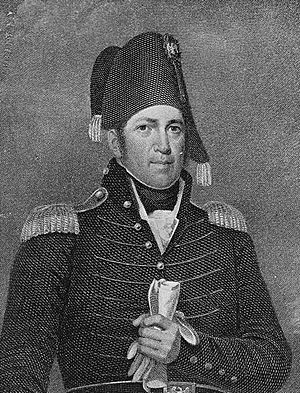Jacob Brown facts for kids
Quick facts for kids
Jacob J. Brown
|
|
|---|---|

Major General Jacob J. Brown
|
|
| Nickname(s) | "Potash Brown" |
| Born | May 9, 1775 Bucks County, Pennsylvania |
| Died | February 24, 1828 (aged 52) Washington, D.C. |
| Place of burial |
Washington, D.C.
|
| Allegiance | |
| Service/ |
|
| Years of service | 1807–1813 (NY Militia) 1813–1828 (US Army) |
| Rank | Major General |
| Commands held | Army of the Niagara 11th Senior Officer of the United States Army Army of the Niagara 1st Commanding General of the United States Army |
| Battles/wars | War of 1812 |
Jacob Jennings Brown (born May 9, 1775 – died February 24, 1828) was an important American army officer. He became famous for his victories during the War of 1812. In this war, he rose to the high rank of general. His success along the northern border of the United States made him a national hero. He was even given a special award called the Congressional Gold Medal.
After the war, the U.S. Army became smaller. But Jacob Brown kept his important position. In 1821, he was chosen to be the Commanding General of the United States Army. This meant he was the top leader of the entire army. He held this job until he passed away.
Contents
Jacob Brown: A Leader and War Hero
Jacob Brown was a key figure in early American military history. He helped shape the U.S. Army. His leadership during the War of 1812 was especially important. He is remembered for his bravery and smart strategies.
Early Life and Military Beginnings
Jacob Jennings Brown was born in Bucks County, Pennsylvania. This was on May 9, 1775. Not much is known about his early life. He joined the New York Militia in 1807. This was his first step into military service. He then joined the U.S. Army in 1813.
Hero of the War of 1812
The War of 1812 was a conflict between the United States and Great Britain. Jacob Brown played a very important role in this war. He led American forces to several key victories. These battles took place along the U.S.-Canada border.
Key Battles and Victories
General Brown was known for his courage in battle. He led his troops in many important fights.
- The Second Battle of Sacket's Harbor was an early success.
- He helped capture Fort Erie. This was a strategic victory.
- The Battle of Chippawa showed his strong leadership.
- The Battle of Lundy's Lane was a very tough fight. Brown was wounded but kept fighting.
- He also led the Siege of Fort Erie. His actions helped defend the fort.
These victories made him a national hero. They showed his skill as a military commander.
Leading the U.S. Army
After the War of 1812, Jacob Brown continued his service. Even though the army was reduced, he remained a general. In 1821, he became the first official Commanding General of the United States Army. This was a very high honor.
As Commanding General, he made important changes. He started new training programs for officers. He also created a system to help recruit new soldiers. These changes helped make the U.S. Army stronger.
Legacy
Jacob Brown passed away on February 24, 1828. He received a special military funeral in Washington, D.C. A long parade marched down Pennsylvania Avenue. He was buried at Congressional Cemetery. Jacob Brown is remembered as a brave general. He helped protect the United States. He also improved the U.S. Army for future generations.
 | Percy Lavon Julian |
 | Katherine Johnson |
 | George Washington Carver |
 | Annie Easley |

